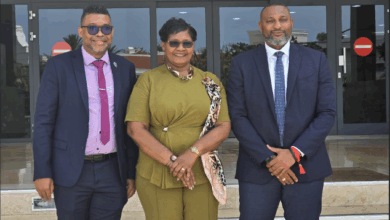(CARICOM Secretariat, Turkeyen, Greater Georgetown, Guyana) It is an honour for me to greet you on behalf of the Secretary-General of the Caribbean Community, His Excellency Irwin LaRocque, on the occasion of the Thirty-Sixth Meeting of the Standing Committee of Caribbean Statisticians (36th SCCS) and the Twenty-First Meeting of the Regional Census Coordinating Committee (21st RCCC), which is being held in the Member State of Belize.
These meetings were preceded by the Ninth Meeting of the CARICOM Advisory Group on Statistics and would be followed by the Fourth Regional Statistical Research Seminar on Friday. Some of us would be staying on in this beautiful Member State of Belize which I understand is [Mother Nature’s best kept secret] and we will be deliberating on the implementation of the 2008 System of National Accounts, a new framework in this area of statistics that is to be implemented globally. Therefore, we do hope that we are able to know the secret during our stay here in Belize. The Deputy Secretary-General of the Caribbean Community, Ambassador Lolita Applewhaite sends her regrets for not being able to attend these meetings and her wishes for successful outcomes.
The theme for this week’s series of meetings takes it cue from the theme of our Caribbean Statistics Day “Recognising the Essential Role of Statistics in the Development of the Caribbean Community”.
The rationale of the Standing Committee of Caribbean Statisticians (SCCS), you will recall, recognises the vital role of sound, relevant and timely statistics in guiding sustainable social and economic development of the Region. The SCCS was established in 1974 by a decision of the Fourth Meeting of the Common Market Council of Ministers with the main objectives of:
Fostering increased recognition of the importance and availability of adequate statistical services to the countries of the Region;
Widening the scope and coverage of statistical data collection; and
Improving the quality, comparability and timeliness of the statistics produced.
As can be seen from the Agenda of this Thirty-Sixth Meeting, the SCCS is fulfilling the mandate given by Council in 1974, ably supported by the CARICOM Advisory Group on Statistics (AGS) which was established at the Thirty-Second Meeting of the SCCS in 2007. The AGS, which works on specific statistical developmental issues and makes recommendations to the SCCS, met in Belize from Thursday to Saturday last week.
A few of the achievements relative to the mandate of the SCCS include:
The decision to observe Caribbean Statistics Day on 15th October every year, which commenced in 2009 based on a recommendation of the AGS to the SCCS. The Caribbean Statistics Day which was observed for the third year this month. It is aimed at raising the profile of statistics in our Community, and also emphasising the importance of statistics to encourage decision-makers, researchers and other users to make use of the statistics produced and in so doing contribute to its utility, improvement and strengthening.
With regard to the objective on widening the scope and coverage of statistical data collection, undoubtedly over the years driven by the SCCS and mainly through donor projects, the scope of statistics has indeed been expanded beyond Economic statistics and Social/Gender statistics. Even though social statistics was being produced in some countries, there were many countries in which the coverage of this area was almost non-existent and in addition the focus on gender was absent;
In the area of Economic Statistics we were able to expand, not just engaged in the area of National Accounts and Merchandise Trade Statistics but also International Trade in Services/Foreign Direct Investment, Tourism Statistics and Tourism Satellite Account for some countries. In addition, National Statistical Offices have also ventured into the area of Environment Statistics and is venturing into other areas such as Statistics on Information and Communication Technologies, evidence of a widening of the scope.
Fundamentally, of the three objectives mentioned earlier, priority has been given by the SCCS to the issue of harmonisation of statistics. Efforts to ensure that the data produced across the region are comparable have been stimulated through a host of donor-funded regional projects as well as activities that continue beyond the lifetime of these projects, all of which are discussed by and gain the approval of the SCCS;
A central effort aimed at harmonisation has been the work put in place by the SCCS on the Regional Statistical Work Programme (RSWP) and the Resolution on Strengthening Statistical Capacity which was respectively approved and passed by Council in 2005 and on which work continues on updating/implementing led by the Advisory Group on Statistics. Supporting activities that have come through the AGS/SCCS mechanisms include the preparation of a Draft Model Statistics Bill to strengthen the data collection capabilities and coordination of the national statistical office/system, funded by the Inter-American Development Bank (IDB); the support of the European Community though the Caribbean Integration Support programme- Ninth European Development Fund in a number of activities, including on the RSWP, Organisation of Databases, common software for Trade data processing, dissemination and for the production of trade indices, a common infrastructure for the submission of data within the national statistical systems and to the regional office; a Help Desk facility; Training in leadership and management and focus on a quality framework and many other activities;
The Twenty-First RCCC Meeting will serve to monitor and evaluate the 2010 Round of Population and Housing Census in countries, to foster the sharing of experiences, the identification of best practices and challenges and to provide support to countries in need. The RCCC is another key mechanism through which the mandate of the SCCS is fulfilled, with the preparation and conduct of a regional strategy to support a common census framework approach. This is again supported by a number of our international development partners including the Inter-American Development Bank, the United Nations Population Fund, the United Nations Children’s Fund, the United Nations Statistics Division, the Government of the United Kingdom of Great Britain and Northern Ireland acting through the Department of International Development, the European Community and other organisations;
On the issue of countries in need for the census, we recently received word that in the Member State of St Vincent and the Grenadines, almost all the completed census questionnaires were destroyed by fire including the water damage during the outing of the fire;
The CARICOM Secretariat has started the process of contacting the agencies mentioned above to see how along with our member countries we can assist the Member State of St Vincent and the Grenadines that would have to redo its Census;
Statistics are at the very heart of almost everything we do. The crucial role of statistics in development and specifically in the daily lives of all persons of our Community, must be underscored, particularly as we seek to compete with other countries and regions of the world. Statisticians have a lot to celebrate and it is obvious, based on the deliberations during this week that there is a recognition that there is still a long road to travel in achieving the desired level of statistical capacity, and in inspiring the public through realising the production and dissemination of high quality and specifically timely statistical products;
However, we are at a juncture where we have heads of statistical offices that are fully committed to the cause. We therefore urge governments of our member countries to invest in statistics on a continuous basis which will help in the realisation of more competitive economies and for the continued improvement in the quality of life of our people;
The Statisticians of this region are encouraged to continue the current momentum to develop statistics nationally and regionally.
I would like to express appreciation for the role being played by our many International Development Partners [such as the European Union, the United Nations group, the United Kingdom, the IDB and all others] in continuing to support the development of statistics.
I warmly thank the Government and people of the Member State of Belize, and the Director-General and his staff for hosting this event and for all the courtesies shown to the delegates so far.
Finally, here is hoping for a productive meeting in the spirit of warmth, goodwill, professionalism and collaboration that continues to inspire the SCCS, as we seek to advance the statistical agenda and to integrate and develop our Community.
I thank you.





